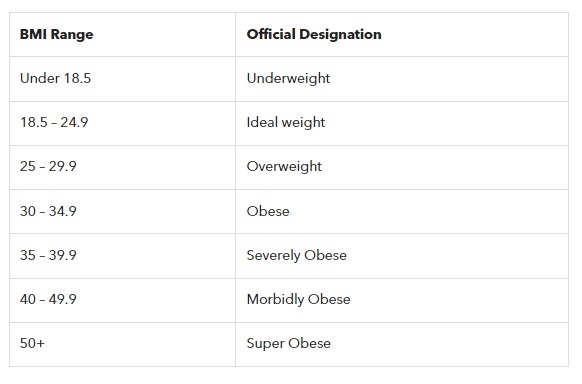What is Obesity?
Defining Obesity
Although most people have a general understanding that being obese means being significantly overweight, the actual definition of obesity is more complex. Currently, the measure most commonly used is BMI.

BMI stands for Body Mass Index, and is a number that’s found by dividing your weight in kilograms by your height in meters, squared. When patients visit our NYC offices, we help them calculate their BMI. Alternatively, you can use our BMI calculator here to easily find your own BMI.
Morbid obesity is a phrase you will hear when learning about obesity treatment options. The typical definition of morbid obesity is an adult with a BMI over 40, or a BMI over 35 if they have a related health condition. These health conditions, known as comorbidities, add to the difficulties of living with obesity. They can include high blood pressure, sleep apnea, high cholesterol, GERD, Type 2 diabetes, and osteoarthritis.
Problems with BMI
BMI is not an ideal measure of obesity for several reasons. It does not take into account factors like muscle vs. fat, and it does not reflect the importance of different types of fat within the body.
Despite the limitations of BMI, it is the currently accepted measurement, and the one used by insurance companies when they make decisions about weight loss surgery coverage.
A more specific type of obesity you may hear about is called abdominal obesity. The amount of fat someone carries around their waist is particularly important because studies have linked this type of obesity with more serious health complications. When looking at abdominal obesity, the general standard is a woman with a waist circumference of more than 35 inches, and a man with a waist circumference of more than 40 inches. While measuring abdominal obesity does not replace BMI, it is an additional number that bariatric surgeons can consider when recommending appropriate options for obesity treatment.
Important Obesity Facts
Learn about the facts of obesity from the nation's leaders in weight loss surgery - The Reem Hospital Abu Dhabi.

Defining Obesity
It is incredibly difficult to lose a substantial amount of weight with diet and exercise alone. Even when people do lose weight, the majority of the time that weight comes back. This is not reflective of a lack of willpower, but instead reflects the biological and environmental barriers to maintaining weight loss. Fortunately, much has evolved in the treatment of obesity over the last few decades. Today we have procedures such as the lap band, gastric sleeve, and gastric bypass as well as even newer devices and treatment options like the Orbera and Obalon balloons.
According to an article by the Harvard School of Public Health, “obesity diminishes almost every aspect of health, from reproductive and respiratory function to memory and mood. Obesity increases the risk of several debilitating and deadly diseases, including diabetes, heart disease, and some cancers.” At Reem Hospital Abu Dhabi we treat obesity with minimally invasive surgery and advanced non-surgical options because we know the toll that obesity can take on a person’s life.

I have a brand new life. I can do things I couldn't do before.
I had a vertical sleeve gastrectomy because I had just become diabetic, and I had hypertension for many years. I lost a total of 157 pounds in 11 months. I have a brand new life. I can do things I couldn't do before. Everyone at Reem Hospital Abu Dhabi has been wonderful. They are kind. They are understanding. They make you feel comfortable. They will guide you every step of the way on your journey so that you can be successful.

